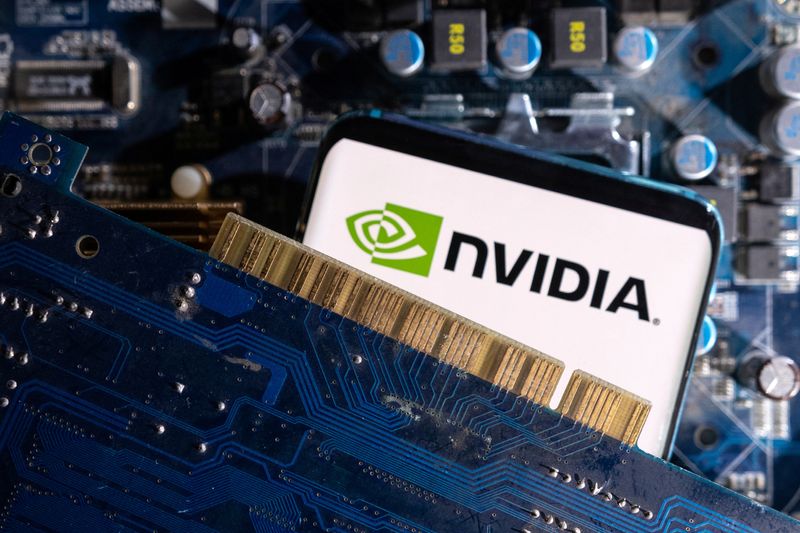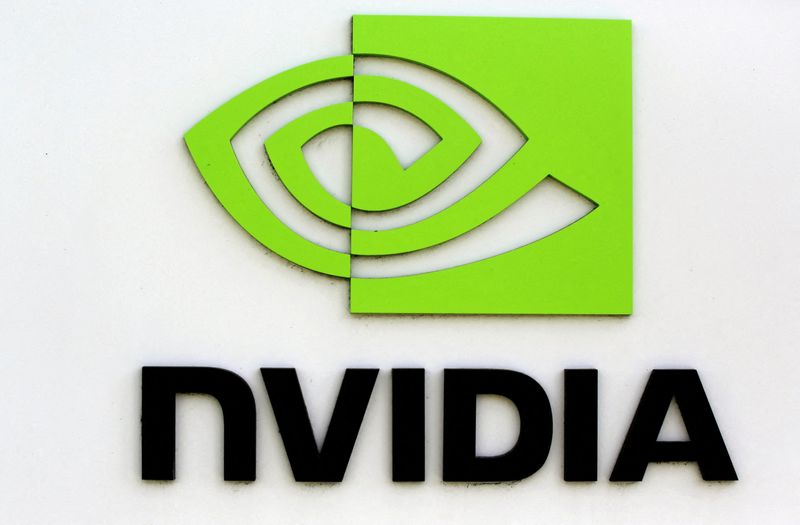By Lewis Krauskopf
NEW YORK (Reuters) - Nvidia Corp’s soaring rally has thrilled investors this year - except for the sizeable number of fund managers who avoided what they believe to be an expensive stock.
Shares of the semiconductor company - whose chips power generative AI apps such as ChatGPT - have more than tripled this year in a rally fueled by excitement over the prospects for artificial intelligence. Yet many funds hold less of the stock in their portfolios compared with Nvidia's weight in key equity indexes, making it tougher for them to beat their benchmarks.
Across nearly 330 mutual funds benchmarked to the S&P 500 or a similar index, only 15% held an above-index weight in Nvidia, according to a Morningstar analysis of the funds' most recent regulatory filings. Among those funds that held a below-average weight in Nvidia, 85% underperformed the index so far this year, Morningstar's data showed.
Nvidia's valuation has been a primary reason keeping some investors away, while others are wary of buying in after the stock’s mammoth 230% run this year. The stock currently trades at 33.6 times forward 12 months earnings estimates, compared with less than 24 times for the Nasdaq 100, according to Refinitiv Datastream.
“One stock is not going to make or break us, but it certainly doesn’t help if you don’t own it and the stock triples,” said Chuck Carlson, chief executive officer at Horizon Investment Services.
Horizon, which has $250 million in assets under management, this year has not recommended clients own the stock in portfolios, which typically are between 30 and 35 stocks. The firm currently ranks Nvidia at the bottom of its models in terms of valuation.
Aside from valuation, concerns about whether demand for chips will continue at current levels and about how the AI landscape will evolve have also kept some on the sidelines.
The evaluation of Nvidia’s shares comes as investors gauge whether a searing rally in Big Tech and growth names has more fuel after valuations ballooned and many winners stumbled in recent weeks. The S&P 500, where Nvidia and other megacap growth stocks have an outsized weighting - is down 2% from its late July highs though up about 17% for the year.
Nvidia and six other megacap stocks - Apple (NASDAQ:AAPL), Microsoft (NASDAQ:MSFT), Alphabet (NASDAQ:GOOGL), Amazon (NASDAQ:AMZN), Meta Platforms and Tesla (NASDAQ:TSLA) - have accounted for about 73% of the S&P 500's total return in 2023 as of Tuesday, according to S&P Dow Jones Indices.
Yet fund managers have been under-allocated to many of those stocks, including Apple, the largest U.S. company by market value.
Mutual funds hold their "widest ever" underweight in the seven names, Goldman Sachs (NYSE:GS) said, with the average large-cap core mutual fund having 18% exposure to the group compared with the stocks' 28% weight in the S&P 500.
"These underweights have been the primary headwind to mutual fund performance" in 2023, Goldman wrote in a recent a note.
SOME INVESTORS WARY
While all seven megacaps have soundly outperformed the S&P 500 this year, Nvidia's performance has been a standout. Nvidia alone accounted for 14.9% of the index's return through Tuesday.
Still, of 15 large tech and growth stocks tracked by Morgan Stanley (NYSE:MS), Nvidia was the third most under-owned in actively managed portfolios as of the end of the second quarter, with only Apple and Microsoft being more under-owned.
"It was a costly error of omission for funds that held an underweight to it," said Robby Greengold, strategist at Morningstar.
Nvidia shares marked a record high closing price on Tuesday, in the wake of a strong earnings report last week. At the same time, the stock's forward price-to-earnings ratio moderated earlier this week to its lowest level in about eight months as analysts increased earnings estimates.
Even so, its valuation makes some investors wary. Although Nvidia’s valuation has moderated since, the stock had a forward price-to-sales ratio of 25 times in late July, according to Jeremy Schwartz, global chief investment officer at WisdomTree.
A historical analysis by Schwartz found that stocks with similar ratios fell a median of 36% relative to the S&P 500 over the next 12 months.
Michael Purves, CEO of Tallbacken Capital Advisors, said Nvidia still looks expensive, based on price-to-sales ratios, while he is also wary of the cyclical swings to which the semiconductor industry has been prone.

Purves is recommending clients hold a "bearish" short-term options position in Nvidia that could be a potential hedge to any market downturn.
"You have seen this stock driven up so far, so fast,” Purves said. "The stock has had an amazing rally, but it would be totally normal for it to correct 20-25%."
